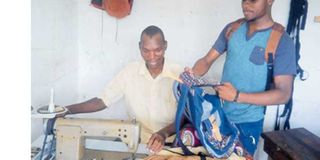Recycling fabrics to save environment

Cecil and his tailor work on a bag ready for sale.
What you need to know:
“This bag went through a number of processes before it became what you see now. This is what textile recycling is all about, making things that would have been thrown away useful,” the 24-year-old second year Bachelor of Science in Environmental Science and Management student at Ardhi University explains proudly.
Satisfaction written all over his face, Cecil Sagawala moves his hand around a bag he is holding as he explains to me how the bag is made from old pieces of fabric that had been thrown away as waste.
“This bag went through a number of processes before it became what you see now. This is what textile recycling is all about, making things that would have been thrown away useful,” the 24-year-old second year Bachelor of Science in Environmental Science and Management student at Ardhi University explains proudly.
Studies show that every year, more than 80 billion new garments are produced but inspite of the good things that come out of the business, the world is unfortunately left with an environmental destruction caused by textile waste.
It is this unfortunate fact that prompted Cecil to take the initiative to be part of those coming up with solutions to the problem. He chose to solve the problem by re-using and recycling textile waste.
“It all started when I and other university students attended the DARE enterprises course organised by Cambridge Development Initiative in Dar es Saalam in September 2017,” Cecil explains.
The training aimed at equipping students with relevant business, social and personal skills to succeed as entrepreneurs so they could use the knowledge to tackle some of the problems facing Tanzania in areas of Water, Sanitation and Hygiene. One way to tackle this economic challenge was through the creation of localised small business designs to address issues related to healthcare, energy and more.
“We visited Tandale area in Dar es Salaam to conduct a survey on the living environment, which is highly polluted. We wanted to know the causes of the pollution and the effects on the community living in the area,” he says.
After identifying the problems people living in the area face, the team was supposed to come up with ways to solve the problems.
“We found a lot of waste disposed near residential areas. There also were many alclothes entrepreneurs who carelessly disposed of unused clothes. The residents too did not have better ways of disposing waste. This inspired me to recycle the textile products.”
Cecil set out to implement his plan armed with only Sh2million. He bought all the necessary tools he needed to start the project. He used the little money he had saved plus money he borrowed from friends, .
The project kicked off last year when he introduced the first products in the market, bags made from fabrics that would have been thrown away to litter the environment.
“The machine we have has the capacity to produce more than 40 bags per month. We sell the bags at Sh15,000 each. For me and my team; a tailor and my business partner, Brenda, this is a big start and we hope to continue making a difference in saving our environment,” he explains.
To get buyers, Cecil and his partners use social media to advertise and sell the bags. Their customers include fellow students, neighbours and friends. They also supply to shops around Mbezi Temboni area.
While Cecil continues to add value to worn out fabrics, he says getting people to believe in what he does requires extra effort. He has been educating people on how worn out clothes can be given a second life. He also convinces society to donate clothes that are no longer in use.
One thing that makes him enjoy what he does is seeing how clothes that were no longer in use are given a second lease of life by re-designing them into new items.
Explaining how he balances college and business, Cecil says doing so has never been easy. “Doing two things which are of importance to you can be a bit of a challenge. School being my primary goal, all I do is divide my time to fit in the activities that I have to accomplish in a day and this is only possible with commitment and consistency,” he notes.
Cecil not only sees himself doing the business in more days to come to make profit but he also wants it to have an impact on society. He wants to transform lives using the products he manufactures.
If he could send a message to fellow youth in the country, his message would be, “The world needs creative individuals who can develop innovative ideas. With increased unemployment there is a need to develop an entrepreneurial culture among students in order to reduce unemployment challenges,” he says.
Email: [email protected]




